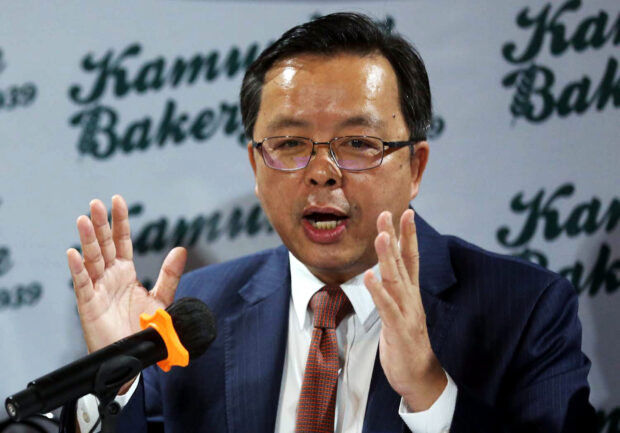
Chinese Ambassador to the Philippines Huang Xilian. INQUIRER FILE PHOTO / NINO JESUS ORBETA
Could Chinese Ambassador Huang Xilian’s message that the well-being of overseas Filipino workers (OFWs) in Taiwan might be undermined by the presence of US forces in Philippine bases have been, as President Marcos put it, “lost in translation”?
Huang triggered controversy when he spoke at a forum organized by the Association for Philippines-China Understanding (Apcu) on April 14 in Pasig City where he “advised” the Philippines “to unequivocally oppose ‘Taiwan independence’ rather than stoking the fire by offering the US access to the military bases near the Taiwan Strait if you care genuinely about the 150,000 OFWs” there.
No clarification
The ambassador had no need for a translation and did not speak through an interpreter as he was reading his 830-word speech entirely in English.
He delivered it verbatim, as seen and heard on a Facebook live recording and based on a copy of it posted on the website of the Chinese Embassy in Manila.
He even corrected himself when he used words that were not in his prepared speech.
Huang gave no opportunity for those present at the forum, including journalists, to ask him to clarify his remarks as he left immediately after delivering his speech.
Former National Security Adviser Clarita Carlos, who was one the members of a panel of reactors, told reporters after the forum that Huang “has the right to say that (about the OFWs) but it is also in their interest for nothing to happen to them.”
“He’s a diplomat so he has to say that,” she added.
Three days later, after his statement met strong criticisms especially from lawmakers, the embassy said on Twitter that Huang was “misquoted” and his remarks were “taken out of context.”
When journalists caught up with him at Jose Abad Santos High School in Manila for the celebration of International Chinese Language Day on Wednesday, the ambassador refused to respond when asked to clarify his statements or how he was supposedly misquoted and taken out of context.
Benefit of the doubt
Mr. Marcos on Wednesday said he was “surprised” at Huang’s statement and that he would summon the ambassador to explain. But he suggested that there might have been a miscommunication.
He gave the Chinese envoy the benefit of the doubt considering that his intentions may have been “lost in translation [because] English is not his first language.”
The ambassador, however, was unequivocal about US “interference” in the China-Taiwan conflict and the Philippines’ role in Washington’s game plan by giving US forces access to nine military bases, particularly three in the northern Cagayan Valley Region close to Taiwan, under the 2014 Enhanced Defense Cooperation Agreement (Edca).
Beijing claims the self-ruled island, which established an independent government after the communist took control of China in 1949, as part of its territory
“Facts speak louder than words,” Huang told the forum. “Obviously, the US intends to take advantage of the new Edca sites to interfere in the situation across the Taiwan Strait to serve its geopolitical goals, and advance its anti-China agenda at the expense of peace and development of the Philippines and the region at large.”
“Some tried to find excuse for the new Edca sites by citing the safety of the 150,000 OFWs in Taiwan, while China is the last country that wishes to see conflict over the Strait because people on both sides are Chinese,” he said.
Domestic issue
Huang emphasized that China “will not renounce the use of force, and we reserve the option of taking all necessary measures.”
“This is to guard against external interference and all separatist activities,” he said.
Carlos agreed with Huang about the purpose of US access to Philippine bases at this time.
“You don’t need an IQ of 140 to know why they are located there but again to repeat, we are not going to be a party to any conflict or armed conflict and we have every right,” Carlos told reporters at the Apcu forum.
She cited the President’s repeated statements that “Taiwan is a domestic issue” between Taipei and Beijing, and that the Philippine military bases “cannot be used for offensive purposes for any country.”
“These bases are located in the Philippines, it has Filipino commanders, nothing happens to the bases without our express approval,” Carlos said.
She said she did not believe that a war would break out over Taiwan “because it will hurt everybody.”
“[I] suspect there’s even a back channeling happening between China and the United States. “Nobody wants to go to war,” Carlos said. “If they want to go to war then they should do it in their own territory.”
READ: China envoy’s Edca warning cites fate of Taiwan OFWs

